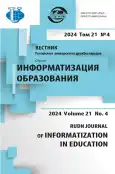Augmented reality technology and possibilities of its use in teaching computer science to junior schoolchildren
- Authors: Zenkina Y.E.1
-
Affiliations:
- School No. 1494
- Issue: Vol 21, No 4 (2024)
- Pages: 465-475
- Section: TEACHING COMPUTER SCIENCE
- URL: https://journal-vniispk.ru/2312-8631/article/view/321358
- DOI: https://doi.org/10.22363/2312-8631-2024-21-4-465-475
- EDN: https://elibrary.ru/SJTXDS
- ID: 321358
Cite item
Full Text
Abstract
Problem statement. In the paper, the author sets a goal to identify the potential of educational technology of augmented reality in the process of teaching computer science to junior schoolchildren using the example of 4th grade students. Methodology. The article analyzes educational and methodological literature, as well as scientific articles by teachers and scientists who propose the use of augmented reality technology in the educational process. The advantages and disadvantages of this technology are identified, and its capabilities in improving the quality of teaching the subject, developing students’ logical thinking, and forming a sustainable motivation to study the subject under consideration are demonstrated. It is concluded that there are insufficient approaches to teaching computer science using augmented reality technology for primary school students. Results. The experiment showed the effectiveness of using augmented reality technology in computer science lessons in primary school. The author of the article argues, that augmented reality technology makes it possible to introduce elements of entertainment and interactivity into the learning process, as well as gamify the process of transmitting knowledge that has a positive impact on the development of cognitive interest of younger schoolchildren in mastering both computer science and mathematics, with which the study of computer capabilities is successfully integrated. Conclusion. The paper outlines several recommendations that make it possible to qualitatively include augmented reality technologies in the process of teaching computer science to junior schoolchildren, designed to diversify the course of teaching the subject under consideration.
About the authors
Yulia E. Zenkina
School No. 1494
Author for correspondence.
Email: zenkinaye@mail.ru
ORCID iD: 0009-0007-6829-4876
SPIN-code: 4978-6199
computer science teacher
1/5 Bolshaya Marfinskaya St, Moscow, 127276, Russian FederationReferences
- Abramova IV. Psychological and pedagogical features of teaching computer literacy to children of preschool and primary school age. In: Modern trends in natural and mathematical education: school – university: Proceedings of the International Scientific and Practical Conference, 13–14 April 2018, Solikamsk. Part 1. Solikamsk: Solikamsk State Pedagogical University, 2018. p. 51–53. (In Russ.)
- Ignatieva EA, Sofronova NV, Ivanova AA. Augmented reality as a promising means of teaching computer science at school. Kazan Pedagogical Journal. 2021;1:208–214. (In Russ.) https://doi.org/10.51379/KPJ.2021.145.2.028
- Taran VN. Application of augmented reality in teaching. Problems of Modern Pedagogical Education. 2018;60-2:333–337. (In Russ.)
- Smirnova NB, Chaikina ZhV, Bolshakova YuS, Deulina SA, Romashova IA. Application of augmented reality technologies in additional education for children. Innovative Economics: Prospects for Development and Improvement. 2020;7(49):235– 240. (In Russ.)
- Karipova AI. Features of logical thinking of junior schoolchildren. Current Scientific Research in the Modern World. 2020;12-4(68):90–92. (In Russ.)
- Oleksiuk VP, Oleksiuk OR. Examining the potential of augmented reality in the study of Computer Science at school. Educational Technology Quarterly. 2022;4:307–327. https://doi.org/10.55056/etq.432
- Hrynevych L, Morze N, Vember V, Boiko M. Use of digital tools as a component of STEM education ecosystem. Educational Technology Quarterly. 2021;1:118–139. https://doi.org/10.55056/etq.24
- Grinshkun AV. On the effectiveness of using augmented reality technologies in teaching computer science to schoolchildren. Vestnik of Moscow City University. Series: Informatics and Informatization of Education. 2016;1(35):98–103. (In Russ.)
- Bosova LL, Bosova AYu. On the professional activities of computer science teachers in the conditions of digital transformation of education. Informatics in School. 2021;7(170):10–14. (In Russ.) https://doi.org/10.32517/2221-1993-2021-20-7-10-14
- Golishnikova EI, Nikiforova EE. The phenomenon of logical thinking. Formation of thinking among students of preschool and primary school age in Russia. In: Development of science and education in the modern world: a collection of scientific papers based on the materials of the International Scientific and Practical Conference, 31 October 2017, Moscow. Part II. Moscow: AR-Consult; 2017. p. 54–57. (In Russ.)
- Boboeva ZM. Features of the development of logical thinking of junior schoolchildren. Scientist of the XXI century. 2022;5-1(86):22–25. (In Russ.)
- Grigoriev SG, Grinshkun VV. On the development of the textbook “Informatization of Education”. Vestnik of Moscow City University. Series: Informatics and Informatization of Education. 2005;4:24–28. (In Russ.)
- Kuznetsov AA, Grigoriev SG, Grinshkun VV, Levchenko IV, Zaslavskaya OYu. Draft of a standard program in computer science for a basic comprehensive school. Vestnik of Moscow City University. Series: Informatics and Informatization of Education. 2011;22:5–24. (In Russ.)
- Grinshkun VV. Quality of information resources and professional quality of teachers. Interrelation and problems. Informatics and Education. 2013;1(240):79–81. (In Russ.)
- Zenkina YuE. Development of logical thinking of junior school children in information lessons. Vestnik of Moscow City University. Series: Informatics and Informatization of Education. 2024;2(68):39–47. (In Russ.) https://doi.org/10.25688/2072-9014.2024.68.2.04
Supplementary files









